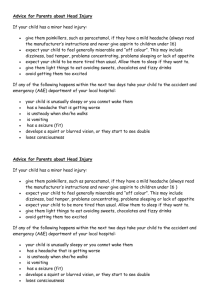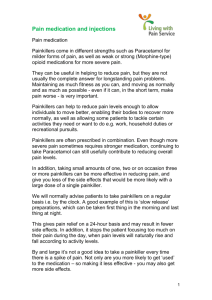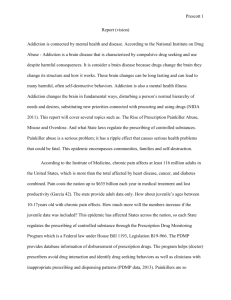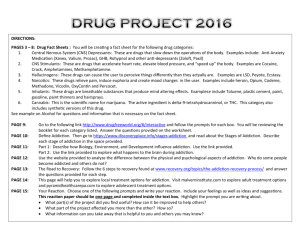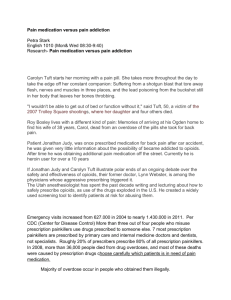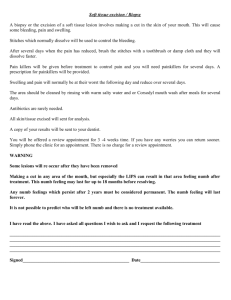Coping_with_Pain
advertisement
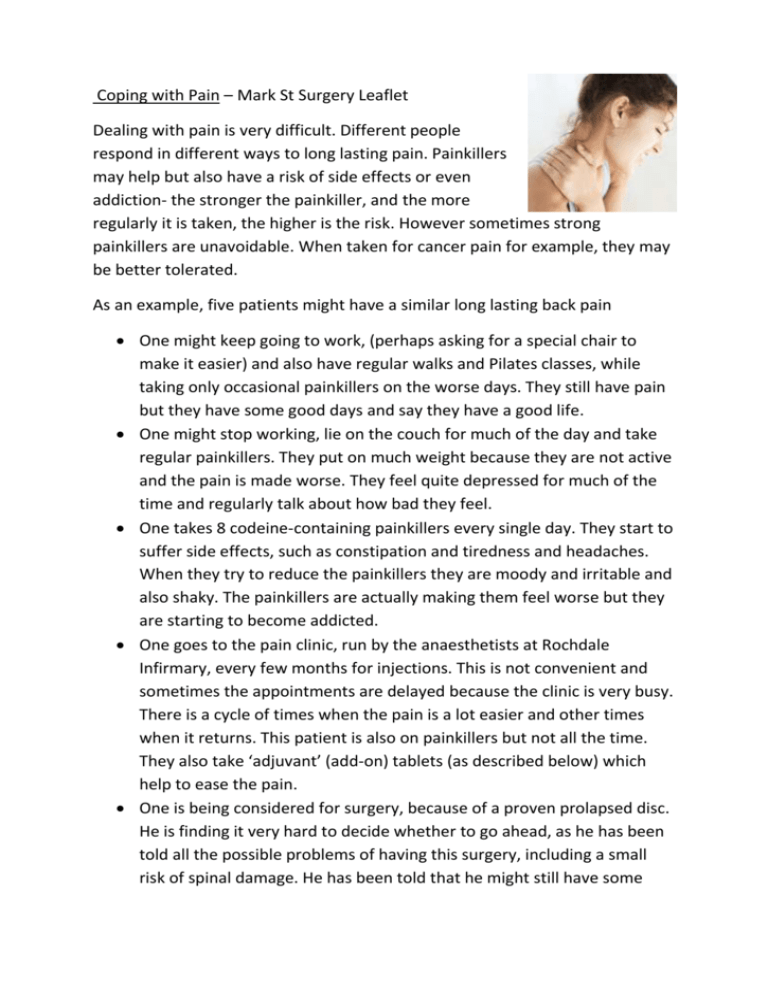
Coping with Pain – Mark St Surgery Leaflet Dealing with pain is very difficult. Different people respond in different ways to long lasting pain. Painkillers may help but also have a risk of side effects or even addiction- the stronger the painkiller, and the more regularly it is taken, the higher is the risk. However sometimes strong painkillers are unavoidable. When taken for cancer pain for example, they may be better tolerated. As an example, five patients might have a similar long lasting back pain One might keep going to work, (perhaps asking for a special chair to make it easier) and also have regular walks and Pilates classes, while taking only occasional painkillers on the worse days. They still have pain but they have some good days and say they have a good life. One might stop working, lie on the couch for much of the day and take regular painkillers. They put on much weight because they are not active and the pain is made worse. They feel quite depressed for much of the time and regularly talk about how bad they feel. One takes 8 codeine-containing painkillers every single day. They start to suffer side effects, such as constipation and tiredness and headaches. When they try to reduce the painkillers they are moody and irritable and also shaky. The painkillers are actually making them feel worse but they are starting to become addicted. One goes to the pain clinic, run by the anaesthetists at Rochdale Infirmary, every few months for injections. This is not convenient and sometimes the appointments are delayed because the clinic is very busy. There is a cycle of times when the pain is a lot easier and other times when it returns. This patient is also on painkillers but not all the time. They also take ‘adjuvant’ (add-on) tablets (as described below) which help to ease the pain. One is being considered for surgery, because of a proven prolapsed disc. He is finding it very hard to decide whether to go ahead, as he has been told all the possible problems of having this surgery, including a small risk of spinal damage. He has been told that he might still have some pain after the surgery. However, he would really like to get off his painkillers and wonders if surgery might help him to do this? As you can see, trying to keep active and staying in work, if possible, can be helpful. Becoming inactive can cause a ‘vicious circle’ and make the pain worse. You should let your doctor know if you are feeling depressed or struggling to sleep, as treatment for these problems can help you to cope with pain. Also it is best if codeine-containing pain killers, or opiates, are only taken from time to time. A key to managing pain is to try to take control e.g. by learning relaxation or breathing techniques, through meditation, pilates, yoga etc. To help, they have to be practised regularly. The more tools you have available, the more chance you have of coping. The Commonly Used Painkillers (analgesics) (please read leaflets in medication boxes also, as the list below shows only frequently occurring side effects and does not give a full list) Paracetamol Under-rated but can be surprisingly effective Low on side effects, occasional constipation, can be harmful if there is pre-existing liver disease Dangerous in overdose – must not exceed 8 tablets per 24 hours Safe in heart disease Safe to take when needing to drive – does not cause drowsiness Codeine A strong painkiller. Can be taken together with paracetamol at the times in the day when the pain is worst (e.g. 2 paracetamol might be taken in the morning and again in the early afternoon and 2 paracetamol with 2 codeine before bed) Likely to cause constipation Drowsiness – can be an issue if taken before driving. (Varies in different people and can sometimes wear off with regular use.) Risk of addiction Can sometimes make pain worse, especially migraine or headache! Anti-inflammatory tablets (NSAIDs) e.g. ibuprofen or naproxen Good for joint and bone pain, especially where there is inflammation e.g. joint swelling, morning stiffness, tenderness etc. Can cause stomach or duodenal ulcers. (Tablets are available to reduce this risk) Can worsen asthma in some patients Low risk of drowsiness Can rarely cause damage to the kidneys or liver or increase the risk of blood clots Can counteract heart medication including that for raised blood pressure Tramadol or Opiates including morphine or oxycodone These are strong painkillers with similar side effects to codeine Can cause drowsiness and affect driving ability Risk of addiction Constipation (may be less with tramadol) – may be eased by laxatives Risk of nausea – may be treated by other tablets Tramadol can increase seizures in patients with Epilepsy Itching skin With use over a long time, pain can actually worsen Painkilling Patches – including buprenorphine and fentanyl Strong painkillers Less risk of constipation than opiates May cause drowsiness and could affect driving ability – especially when first becoming acclimatised to the medication May have local side effects e.g. itching or rash May cause addiction Should not be cut nor heated (e.g. do not place a hot water bottle over the patch) as could cause sudden unpredictable increase in dose Add-on (‘adjuvant’) PainKillers e.g. amitriptyline, gabapentin or pregabalin May be used together with other ‘traditional’ pain killers to make them more effective Side effects specific to the particular medication Low risk of addiction May reduce the dose needed of the original pain killer May be helpful in controlling nerve pain - often described as burning in nature Useful websites: www.paintoolkit.org ---Simple to use website with local links for self help with pain- (co-written by patients) www.kirkleespersistantpain.com- Website written by a GP pain expert, userfriendly (some links are to Kirklees services) www.sheffieldachesandpains.com- Comprehensive website specific to pains in different areas of the body (some links are to Sheffield services however) www.sheffieldbackpain.com- similar to the above, relevant for chronic backpain www.sheffieldpersistantpain.com- similar to the above www.fivewaystowellbeing.co.uk- helps you to check on your mood. Is your pain making you feel depressed? Gives links to local voluntary services www.thebigwhitewall.com – a useful website if you are suffering from depression or anxiety associated with your pain
